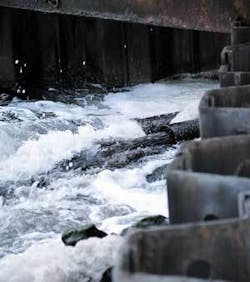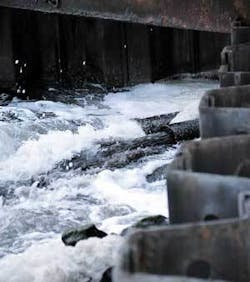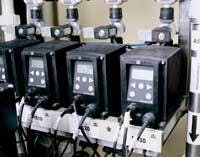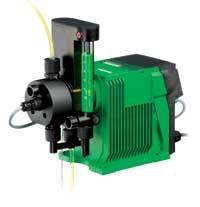Digital Technologies Advance Performance of Metering Pumps
Metering pumps, also called dosing pumps, are found in virtually every facet of water and wastewater treatment. The pumps are often used to inject expensive additives, so their ability to meter precisely is critical. A new generation of metering pumps that feature digital technology holds the promise of improved accuracy and control, simplified operation and lower costs.
By definition, metering pumps are positive displacement pumps used to inject controlled volumes of liquid, incorporating an internal means of adjusting capacity. Metering pumps began as rudimentary machines that incorporated crude mechanical adjustments to control capacity. Flow-rate confirmation and pulsation dampening have been supplied as external accessories, often more than doubling the cost of a metering installation. Innovation has been focused on improved capacity control, reduced leakage, and handling difficult liquids.
Using state-of-the-art motor technologies, in combination with advanced software to improve electronic control, new digital dosing pumps control the dose by adjusting the diaphragm’s speed of travel. Any capacity selected is dosed with the same length of diaphragm travel. This avoids the frustrating hydraulic complications that impact accuracy and dependability when capacity is changed by adjusting the travel of the diaphragm, the stroke length.
The speed of both discharge and suction stroke can be varied independently. In some of the digital pumps, the discharge stroke can be adjusted to last over 25 seconds for dosing in critical low flow applications, affording very smooth chemical injection. Such precise stroke control facilitates easier priming, and permits improved handling of difficult applications.
The new technology also provides even greater range of capacity adjustment (e.g. 1000:1), and without compromising accuracy. Noise, shaking and stress on piping and accessories also are all reduced, as digital dosing provides the least pressure spike of any metering pump to date.
Key innovations being incorporated into this newest technology of metering pumps include the ability to directly monitor dosing-head conditions like pressure and flow; then process these outputs in conjunction with motor readings on a continuous basis. This allows users with applications like ultra filtration and reverse osmosis to closely track performance and condition of the pump and system of which it is a part. Some of the new digital dosing pumps can already self-compensate based on changes in the variables being monitored.
Combining dosing, measuring, and regulating into one machine means that user are not required to make traditional arithmetic calculations to set the pump’s flow. They simply input desired injection rates. The flow rate set is what the pump delivers, without the need for independent flow measurement, which historically costs more than the metering pump.
This new technology opens up a whole new world of possibilities. Tomorrow’s metering pumps will seem like robots; able to monitor, troubleshoot, perform diagnostics, and appropriately adjust their operation to conform to application changes and control variables, all done in one instrument, seamlessly; even wireless. Digital dosing will eliminate system dependency on many accessories commonly used today such as flow meters, pressure relief valves, calibration columns, and pulsation dampeners.
Metering pumps of this new design platform will truly be resetting the expectations for “user friendly.” Finally, the costs of metering installations will decline as the value in digital dosing pumps advances, making the metering pumps complete dosing solutions.
Case Studies
Like most public utilities, the Salt Lake City Public Utilities (SLCPU) wants to be sure new technology provides measurable benefits before making wholesale conversions to such technology. To that end, the water utility originally purchased a digital dosing pump as a back-up metering pump, to allow them to take older solenoid pumps out of service for maintenance. This also allowed them to “test drive” the digital pump in a variety of metering applications.
During the testing program, the utility staff found they were able to use the same pump, with no material changes, to handle several polymers, sodium hypochlorite, caustic soda, and ferric chloride. The inherent variable speed capability in the new pump also permitted viscous products to be more completely drawn into the pumping chamber than the fast moving diaphragms on SLCPU’s solenoid metering pumps.
After two years of testing, Ken Hibbert, Water Plant Manager for SLCPU, is satisfied that the digital pump has proven to be superior to solenoid pumps that they have used in the past. SLCPU plans to convert other metering applications to this new technology.
Hibbert was most excited about the high turndown ratio the digital pump offered. The utility sees a huge variation in stream flow and turbidity throughout the year, and their need for treatment chemicals varies widely. In the past they have needed two different sizes of solenoid metering pumps to meet the treatment chemical flow range. The 800:1 turndown ratio of the new digital pump allows this to be done with a single pump. The same pump can even be used to replace the much larger and more expensive roto dip feeders that SLCPU has used for high turndown chemical feed applications.
The City of Fresno, CA, Water Department installed 40 Grundfos DME 8 digital metering pumps in chlorine injection service at some of their wells roughly two years ago, and an additional two pumps in fluoride injection. The utility has more than 200 older style metering pumps of various brands installed as well. According to Dennis Hall, Water Systems Operator II, the Grundfos pumps are extremely simple to use. The stepper motors provide even flow, with no pulsations, a big change from the high pulsations that their older metering pumps produce.
Hall commented that setting the flow rate directly, without having to deal with stroke adjustment, greatly simplifies the setup for these pumps, and results in reaching the desired residuals much quicker. He also said that calibration of the Grundfos pump is faster and easier, and can be done with the pump working against no pressure, or against full system pressure, with equal accuracy.
Staff at Collier County Water, FL, has found the main benefits of their Alldos digital dosing pumps to be simplicity of use, reliability, and accuracy. The water utility has four of the pumps in service in its North Regional Water Treatment Plant, metering scale inhibitor and phosphate, according to Senior Operator Barry Erickson and Plant Mechanic Brian Bower.
They find changing feed rates on the pumps to be very simple, requiring only an adjustment of the digital readout on the pump control panel (no need to balance stroke length adjustment against stroke frequency change).
A spot check of the flow rate using drawdown tubes invariably finds that changes in flow are accurate, that the pump is doing exactly as they have set it to do. Everyone in the plant that works with the Alldos pumps is quite pleased with the digital dosing performance.



